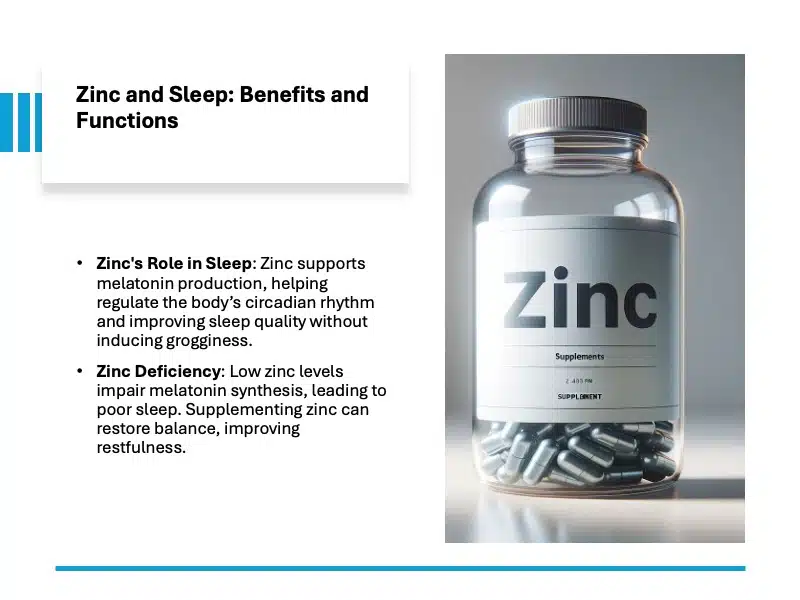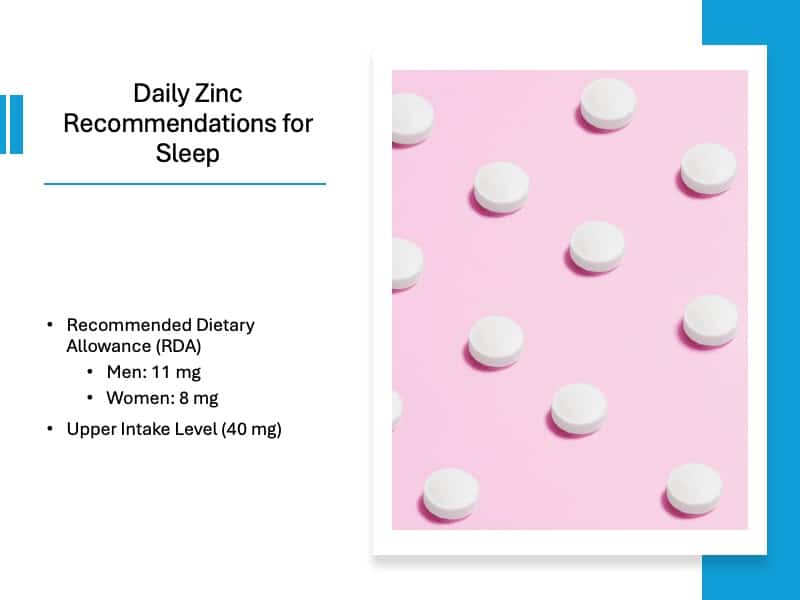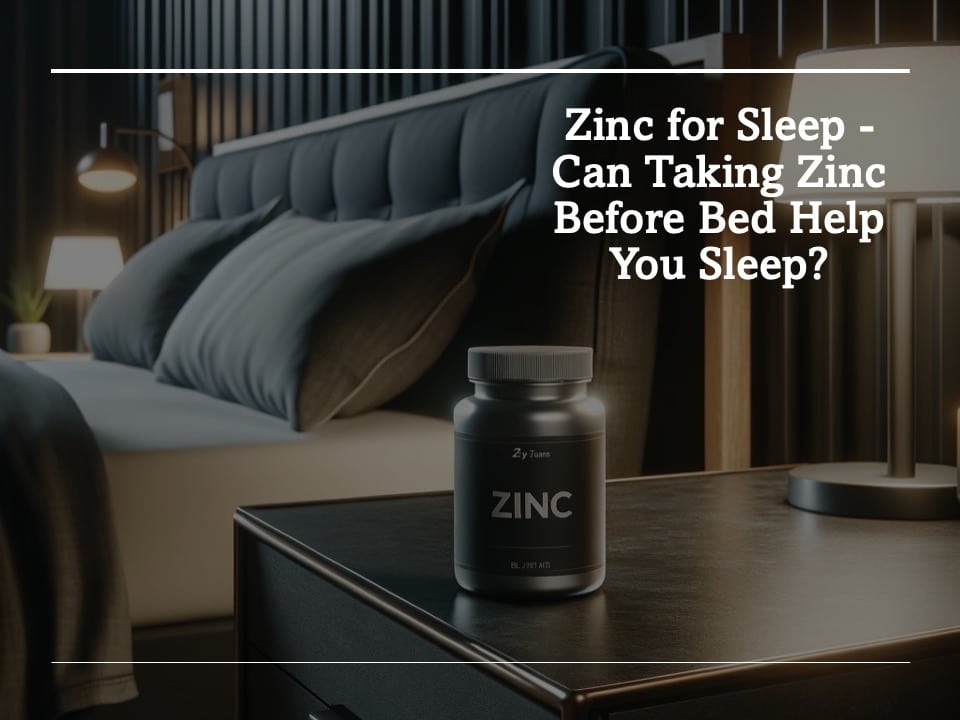Taking Zinc Before Bed: Is Zinc Good for Sleep?
Zinc helps you sleep.
Without enough zinc, your body struggles to produce melatonin, the hormone that regulates sleep (Cherasse & Trade, 2017).
In these cases, supplementing with zinc before bed can help restore balance, improving both sleep quality and overall well-being.
However, taking zinc for sleep doesn’t sedate you like melatonin supplements or other sleep aids. Instead, it supports your body’s natural rhythm, aligning your internal clock for deeper, more restful sleep.
If you already get enough zinc from your diet, taking zinc supplements likely won’t make a noticeable difference, as your body has what it needs for normal functioning.
However, if you’re deficient in zinc, supplementing could be a simple and effective way to enhance your sleep quality.
One critical note: ensure any zinc supplement you choose provides a low-to-moderate dose of bioavailable zinc, as the Tolerable Upper Intake Level (UL) is 40 mg daily. Exceeding this, especially from supplements, can be harmful.
I’ll dive deeper into how zinc supports sleep in the rest of this article, but if adding zinc to your routine feels like the missing piece to improving your sleep, I recommend Rootcha’s Magnesium + Zinc.
This supplement combines zinc with magnesium, another mineral that promotes relaxation, sleep quality, and overall health.
Rootcha’s formula includes 400 mg of magnesium and 15 mg of zinc—ideal amounts to complement your diet and support your daily needs.
Last update on 2025-04-24 / This article includes affiliate links/Images via Amazon Product Advertising API. I may earn commissions on purchases made through these links.
Zinc for Sleep: Reviewing the Evidence
Zinc is an essential mineral that plays a vital role in numerous bodily functions, from supporting immune health to promoting hormonal balance.
Zinc doesn’t make you sleepy, but taking zinc for sleep is a generally safe and effective way to improve your sleep quality, immune system, overall health, and more!
As a health and body-conscious professional athlete, I’ve taken zinc before bed for years, especially during the fall and winter.
Sleep is the cornerstone of recovery and well-being, and understanding how to use zinc for sleep is crucial for anyone looking to optimize their health.
While I focus on getting enough zinc through foods like meat, shellfish, and legumes, I know I’m not perfect, and eating enough zinc-rich foods isn’t always possible.
In those times (usually in the fall and winter of my basketball seasons), I like to add a zinc supplement like Rootcha Magnesium & Zinc Complex to my diet for additional sleep and immune support.
Last update on 2025-04-24 / This article includes affiliate links/Images via Amazon Product Advertising API. I may earn commissions on purchases made through these links.
Why Does Zinc Help You Sleep?

Beyond its roles in various bodily functions, including immune health, wound healing, and DNA synthesis, many wonder, does zinc help sleep?
One of the primary benefits of taking zinc supplements is their ability to maintain hormonal balance, particularly by regulating melatonin production—the hormone responsible for the sleep-wake cycle and your body’s circadian rhythm.
So, does zinc help you sleep better? Absolutely.
Zinc is integral to melatonin synthesis, and a deficiency in zinc can impair melatonin production, potentially causing sleep disturbances.
Ensuring adequate zinc levels helps your body produce melatonin efficiently, which in turn promotes better sleep quality.
By supporting these processes, taking zinc before bed can promote restful sleep, making it easier to fall asleep and stay asleep throughout the night.
For zinc-deficient individuals struggling with sleep issues, incorporating zinc into their routine can be a natural and effective way to enhance sleep health.
Does Zinc Make You Sleepy?
Zinc does not directly make you sleepy or drowsy, but it plays a crucial role in supporting healthy sleep cycles, especially if you have a zinc deficiency.
Since zinc is involved in the synthesis of melatonin, when zinc levels are low, melatonin production can be disrupted, leading to potential sleep issues.
Supplementing with zinc or consuming zinc-rich foods can help normalize melatonin levels, promoting a more restful sleep pattern over time.
For those with a deficiency, zinc can help regulate the body’s circadian rhythm, leading to improved sleep quality and, in some cases, a natural feeling of sleepiness at appropriate times.
If zinc intake is balanced within your daily requirements, its sleep-supporting properties are likely subtle, though its role in overall sleep health is beneficial, especially when addressing deficiencies.
Optimal Dosage of Zinc for Sleep

For adults, the Recommended Dietary Allowance (RDA) for zinc is 11 mg for men and 8 mg for women.
However, the Tolerable Upper Intake Level (UL) is 40 mg per day, meaning you should avoid exceeding this amount to prevent potential side effects.
Always consult with a healthcare provider before starting any new supplement regimen, especially to determine the appropriate dosage for your specific needs.
Benefits of Combining Magnesium, Melatonin, and Zinc for Sleep
Combining magnesium, melatonin, and zinc has shown promise as a natural remedy for improving sleep quality and combating insomnia.
Research suggests that this combination may help individuals fall asleep faster, reduce nighttime awakenings, and enjoy more sustained, restful sleep (Wojnar et al., 2021).
Each of these supplements plays a unique role in promoting relaxation and sleep health.
Magnesium helps to relax muscles and reduce stress by supporting GABA—a calming neurotransmitter—while melatonin directly regulates the body’s sleep-wake cycle.
Zinc, meanwhile, supports melatonin synthesis and contributes to overall nervous system health, enhancing the effectiveness of both magnesium and melatonin.
Adding magnesium, melatonin, and zinc to your nightly routine provides a synergistic approach to improving sleep quality and may be especially beneficial for those struggling with chronic sleep issues.
How to Determine If You Need Zinc for Sleep
To figure out whether a zinc supplement is necessary or if zinc can help improve your sleep, the best approach is to start by performing a dietary recall for 24, 48, or ideally 72 hours.
Use a tool like MyFitnessPal to track your daily zinc intake and compare it to the Recommended Dietary Allowance (RDA).
I aim for higher than the RDA because that value is essentially a minimum requirement. I typically aim for around 25mg of zinc per day, especially during the fall and winter months when immune support is more critical.
As a bigger person (I’m 6′ 10″) with greater nutrient needs, I find this amount works best for me.
However, if your dietary recall reveals a low zinc intake, you can consider using a zinc supplement, ideally about an hour before bed.
Start with a lower dosage to see if it contributes to better sleep, as zinc for sleep has been to work by supporting melatonin production.
If you notice improvements in your sleep, I recommend getting blood work done to assess your nutrient status.
This will give you a clear understanding of any deficiencies, allowing you to tailor your zinc supplementation to meet your exact needs.
Lifestyle Factors That Influence Zinc Needs
Your lifestyle plays a major role in how zinc impacts your sleep. Factors like stress, poor diet, and sleep deprivation can deplete your body’s zinc levels, making it harder for you to maintain optimal sleep patterns.
Chronic stress, in particular, has been shown to deplete zinc stores in the body, which may disrupt melatonin production and lead to poor sleep quality.
This is especially important for athletes or individuals with high physical demands, as they tend to have greater nutrient needs, including zinc.
Additionally, excessive alcohol consumption and poor dietary habits can lower zinc absorption, exacerbating deficiencies.
Addressing these lifestyle factors alongside zinc supplementation can have a greater effect on improving sleep than supplementing with zinc alone.
Common Zinc-Deficient Populations
Certain populations are more likely to benefit from zinc supplementation, particularly those at risk of zinc deficiency. This includes:
- Pregnant and Lactating Women: They require more zinc for fetal and infant growth and development (must only take doctor-recommended supplements).
- Children: Zinc is essential for growth and development in children. Zinc deficiency can lead to stunted growth and impaired immune function (must only take doctor-recommended supplements).
- Vegetarians and Vegans: Plant-based diets may not provide enough zinc, as zinc absorption from plant-based sources is lower than from animal-based sources.
- Older Adults: Zinc absorption decreases with age, and older adults may also have a decreased appetite, which can lead to lower zinc intake.
- Individuals with Gastrointestinal Disorders: Conditions such as Crohn’s and celiac disease can affect zinc absorption and increase the risk of deficiency.
Best Zinc Supplement for Sleep (2025)
When choosing a zinc supplement for sleep, it’s essential to consider factors like bioavailability, the form of zinc, and third-party testing for purity to ensure you’re getting a high-quality product.
Bioavailability is particularly important, as it determines how well your body can absorb and utilize the zinc.
For those shopping on their own, prioritize supplements that use highly bioavailable forms of zinc, such as zinc picolinate.
Zinc picolinate is one of the most easily absorbed forms, making it an excellent choice for those looking to maximize zinc’s sleep-enhancing benefits.
The option I suggest is Rootcha’s Magnesium + Zinc Complex.
This supplement contains 15 mg of chelated zinc picolinate combined with fully reacted magnesium for enhanced absorption.
The synergy between magnesium and zinc helps promote relaxation and supports melatonin production, improving sleep quality.
Moreover, Rootcha’s Magnesium + Zinc Complex is free from harmful additives and fillers, and is third-party tested for purity, ensuring you’re getting a clean, effective product that can support your sleep without unwanted ingredients.
Last update on 2025-04-24 / This article includes affiliate links/Images via Amazon Product Advertising API. I may earn commissions on purchases made through these links.
Final Thoughts: Should You Take Zinc for Sleep?
Taking zinc for sleep can be a game-changer, but only if your body needs it.
If you’re not getting enough zinc from your diet, supplementing could help regulate your circadian rhythm, improve melatonin production, and enhance overall sleep quality.
However, if your diet already provides adequate zinc, adding a supplement might not offer any additional benefit.
Sleep is deeply personal, and what works for one person may not work for another.
For those considering zinc, a high-quality supplement like Rootcha’s Magnesium + Zinc is an excellent option. Its balanced formula supports both sleep and relaxation while ensuring you stay within safe intake limits.
Prioritize whole, zinc-rich foods whenever possible, and use supplements to fill in the gaps when necessary.
Sleep is essential to health and recovery, and understanding how zinc fits into your overall strategy can help you wake up feeling rested and ready to take on the day.




